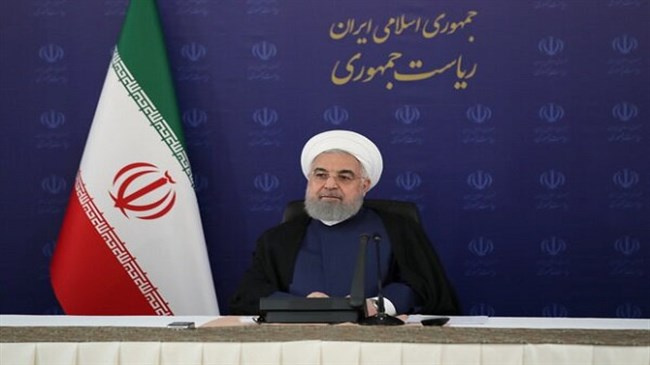Ending US economic terrorism a must for JCPOA survival: President Rouhani

President Hassan Rouhani said maintaining the 2015 nuclear deal, also known as the Joint Comprehensive Plan of Action (JCPOA), requires the US move to end its economic terrorism against the Iranian nation.
"The new US administration should immediately stop the economic terrorism. If so, the path will open; then we can negotiate and talk,” Rouhani said during a Cabinet session on Wednesday, according to Mehr News Agency.
However, he noted no talks will be held about JCPOA, as it is a done deal and will not be renegotiable; in fact, any talks will be held within the framework of the deal.
Stressing that the US and European parties to the nuclear deal (Britain, France and Germany) should fulfill their obligations, despite their conduct in the past years, President Rouhani said, "We have reduced our obligations, but we are still committed to the JCPOA and try to protect it."
“We were the side who kept it. If we have not been patient during the three years of economic war, there would be no survival of the pact today,” he added.
He said the nuclear deal is alive thanks to the patience and resistance of the Iranian people, adding that the United States had left it and Europe did nothing out of fear, but Iran stayed in the deal instead of doing the same.
“We could have pull out of it, but we kept it.”
Rouhani called on the European parties to the deal to review and judge their own actions and moves in since the US unilaterally withdrew from the pact to see if they have really fulfilled their commitments.
“The three European countries showed weakness and, in many cases, even inaction, while the United States committed all kinds of crimes [against Iran] during the past three years.”
The president also referred to an agreement between Iran and the International Atomic Energy Agency and described it as a “smart move” which foiled the US plot to destroy the JCPOA.
At midnight on Monday, Iran stopped the voluntary implementation of the Additional Protocol that allowed the IAEA to carry out short-notice inspections of the country’s nuclear facilities.
The halt came under the Strategic Action Plan to Counter Sanctions, a law passed last December by the Iranian Parliament. The legislation set February 23 as a deadline for the Iranian government to further scale back compliance with the JCPOA if the US does not lift its sanctions against the Islamic Republic.
The withdrawal from the Protocol adds to Iran’s previous steps away from the nuclear accord in response to the US’s unilateral withdrawal in 2018 and the other parties’ failure to fulfill their commitments.
It followed an agreement between the IAEA and the Atomic Energy Organization of Iran (AEOI), under which the latter would continue to use cameras to record information at its nuclear sites for three months, but it would retain the information exclusively. If the US sanctions be lifted completely within that period, Iran will provide the footage information to the UN nuclear watchdog, otherwise it will be deleted forever.
Source: Iran Daily

